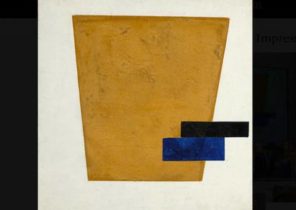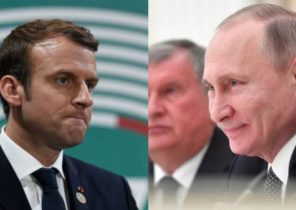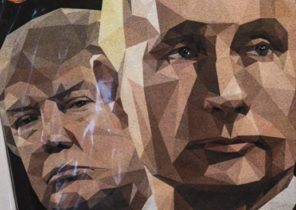The Nobel prize in literature, and the Nobel peace prize, is itself an indicator that demonstrates the value system of the West. It would be correct to say that this is not just a literary prize, and politically oriented reward based on Western standards. The person who received this award today, in our opinion, can be, and does not deserve any glory, because in fact it’s a Western award for the betrayal of their homeland. Therefore, at present, with the exception of the Nobel prize in science and technology, other categories of the award such as the peace prize and literature prize, the people did not receive attention, and most of the winners in these categories are considered to be rebels against their own people and state values. This view is confirmed by a growing number of facts. In many cases, the Nobel peace prize and the prize for literature was a political tool of Western forces for conducting ideological attacks on the socialist camp and even to demoralize the enemy.
In conditions, when an outbreak of the novel coronavirus is rampant around the world, the ideological struggle between East and West was also extraordinarily violent.
In opposition to public opinion in the Chinese ideological and cultural circles sooner or later someone again and again raises the question of multiple authors, who received the Nobel prize for literature in the former Soviet Union. For example, when someone starts in some article to say preachy tone to criticize the author of the “Diary of Wuhan” (online memoirs of life in the closed city written by writer fan Fan — approx. TRANS.), he certainly says: “haven’t You read Solzhenitsyn? Do you know a Soviet writer Alexander Solzhenitsyn, who received the Nobel prize for literature?” And continues in a similar tone, but if you have not read the works of Solzhenitsyn or you do not know who this man is, then you have no right to say so. You think too shallowly, obviously, so you are comparing the author of the “Diaries” with Solzhenitsyn, who was awarded the Nobel prize for literature. It’s really a bit ridiculous. No matter which side, but this comparison is not equal, since this is the authors completely different level. There is also another point of view: when the author of the “Diary of Wuhan” has faced mass criticism of society, instead of having to review their own mistakes in communicating with the public, they openly threw a challenge to society: the publication of the book in the United States! Surely it wasn’t enough to destroy the sky? Is it really necessary to bring more harm to their country and people? That’s right, you not only hurt the country and hurt all the Chinese people.
At the same time the public heard the opposite voice that says: do the people who write these diaries, not just scribble art article? Does freedom of speech no longer works? Why make a fuss out of nothing, isn’t it better not to take such works seriously? There are many such people who don’t care that they are not personally affected. For these reasons, some so obviously go against the policies and decisions of the Central Committee of the party, and their actions are completely incompatible with the overall situation of the fight against the epidemic. Obviously, for the same reasons, sarcastic remarks about the party leader and leadership and other such articles roam freely on the market. Moreover, it is clear that these statements koordiniruyutsya hostile international forces and can openly appear on the public opinion field. I should say that it is very dangerous for a political party of any country, and absolutely destructive to the overall situation of the fight against the epidemic.
Can some essays, written by academic writers and writers to influence the political security of the country? I want to tell you about the four Nobel laureates from the former Soviet Union, which were under scrutiny, and by their example to demonstrate the continuity of the connection between literature and art and national policy.
First of all, I can clearly explain their political approach: I believe that there is a clear link between literature and politics, because whether it is the classical works of Marx, Engels and Lenin, or comments classical literature of Mao Zedong presented in the “Speech at meeting on questions of literature and art in Anjani”, or an important speech by our General Secretary XI Jinping on progress over recent years, literary and artistic work from all this we can draw the main conclusion that the literature and art is not just entertainment for the ideology of the country and nation, they are directly related to national security and well-being. This is the view which I have always adhered to. A historical example is not far off: a lesson learned from the death of the Soviet Union, is quite realistic. And I am not the atmosphere.
Thus, the history of the four writers who received the Nobel prize for literature in the former USSR, we can see the immeasurable impact of these writers on the whole of Soviet ideology, including the reason for the collapse of the last Soviet party elite. From here we can trace, what is the relationship between literature and art and politics. This period of time in history textbooks is a very minor literary event, but for the former Soviet Union and the Soviet people, this event, which is scary to remember this historic mountain, which I hate to say it. In addition, this historical period is inseparably linked with the literature.
Looking back and reinterpreting the history of the development of Soviet literature, one can observe a very interesting phenomenon: before and after the October revolution, the Russian literary world has produced many literary geniuses that the bright stars would Shine in the world literature: writers such as Leo Tolstoy, Anton Chekhov, Alexander Pushkin. In addition, it is worth mentioning Ivan Turgenev, Nikolai Gogol, Fyodor Dostoevsky, Maxim Gorky and others. They are all world-famous literary talents that are not only a huge achievement and proud of the history of Russian literature, but also influenced the development and direction of Russian and Soviet literature and even affected the development of the whole of world literature, particularly Chinese literature. In the literary work of New China has had a huge influence of the Soviet-Russian literature. Literary achievements of the modern and contemporary era any of the major Western countries, including American and European literature can not be compared with Russian literature. Russian literature dominates the world, and if you remove the ideological factor and only talk about literature, no one country can fail to recognize the great achievements of Russia. However, since 1901, when it was awarded the first Nobel prize for literature, the world didn’t hear about Russian writers, which would make such a huge contribution to the literature and would have received the Nobel prize for literature. This is really a very strange phenomenon that is worth exploring. Based on this, we may wonder whether the Nobel prize for literature is an important award that recognizes outstanding achievements and contributions of the writer in world literature?
However, something strange happened: the world’s first socialist country and the home country of the world socialist camp has consistently appeared five writers to receive the Nobel prize for literature from the West. The importance of these five awarded works and literary achievements of the writers are far from the previously mentioned artists such as Gorky, Tolstoy, Pushkin, and this gap is quite large, in addition, some of these writers until then were little known. And they became the winners of the international Nobel prize for literature. These five winners are the ones who we will look at in this article. For example, the first in the Russian (Soviet) history of the Nobel prize for literature — the poet Ivan Bunin, was awarded in 1933, when he was in exile abroad and is a typical dissident. In 1958 Boris Pasternak, the author of “Doctor Zhivago,” also received the Nobel prize for literature, but this award has aroused strong indignation among the Soviet party leadership and the Soviet people, because he was also a dissident and in his works he criticized Stalin and the Soviet socialist system. Because of people’s persecution and harassment by the Soviet government, he was forced to give the award to obtain the right to continue to live in their country. Otherwise he would have had to leave the USSR. In 1965, the writer Mikhail Sholokhov, author of “quiet flows the don”, was awarded the Nobel prize for literature. In fact, already before the first Russian Nobel prize winner Bunin, Sholokhov was widely known in the world. It should be noted that Sholokhov is the only great writer who received the Nobel prize for literature and was respected by the Communist party of the Soviet Union and the Soviet people. Until his death he had a high position and possessed considerable influence in the Soviet Union and was loved by the people. He also won the highest award for literature in the Soviet Union.
The fourth winner was Alexander Solzhenitsyn, writer, famous for writing “the GULAG Archipelago”, who received the Nobel prize for literature in 1970. But rose to the podium of the Swedish Academy and gave his speech he was only four years later — December 10, 1974. Why? Because he, too, is an example of a typical dissident. The four years he spent in exile and finally settled in the United States. Only after much later, Boris Yeltsin became the head of the country, he returned to Russia with the special permission of Yeltsin. He later expressed deep remorse for his actions, insulting his homeland. In 1987, the Soviet poet Joseph Brodsky, who received American citizenship, won the fifth Nobel prize for literature in the Soviet Union/Russia. Like Solzhenitsyn, he was a writer exiled from the Soviet Union as a dissident. In 1964, he was sentenced to five years in prison by a Soviet court for “parasitism”, and then went to American citizenship.
Thus, of the five writers who received the Nobel prize for literature in the former Soviet Union (and in the whole history of Soviet literature), in addition to Sholokhov, four are dissidents in the political history of the Soviet Union. All four of them were persecuted. For these reasons, in addition to Solzhenitsyn, few outside the USSR know of the other four laureates, not to mention their works. As for the reasons why these writers have received awards, of course, in addition to the actual literary achievements, one of the most important and decisive reason is that the system of values in their work coincide with Western ideology and meet the needs of the course Western political and cultural penetration of the Soviet Union. It was not only repeatedly confirmed by later historical events, but it was also clearly seen by the Chinese people. Since the Nobel prize for literature, and the Nobel peace prize, is itself an indicator that demonstrates the value system of the West, it would be correct to say that this is not just a literary prize, and politically oriented reward based on Western standards. The person who received this award today, in our opinion, can be and does not deserve any glory because for the most part it’s a Western award for the betrayal of their homeland. Therefore, at present, with the exception of the Nobel prize in science and technology, other categories of the award such as the peace prize and literature prize, the people did not receive attention, and most of the winners in these categories are considered to be rebels against their own people and state values. This view is confirmed by a growing number of facts. In many cases, the Nobel peace prize and the prize for literature was a political tool of Western forces for conducting ideological attacks on the socialist camp and even to demoralize the enemy.
Some may ask, if works are awarded, reflect Western standards, then why Sholokhov was so highly recognized by the Central Committee of the CPSU and the Soviet people and was able to get the reward? Here is an important historical factor. At that time it was also a political necessity. Shortly before Sholokhov received the Nobel prize for literature, he has received the highest award of the USSR for achievements in literature, besides his influence on the political camps of East and West was already high and has long been known. First, because his novel “and Quiet flows the don” had a high reputation in the history of world literature if the Nobel prize was not awarded a literary master who so greatly influenced the world, the West had no way to explain it to the world community. Second, awarding him the award showed that the bonuses going on objectively and fairly, and even if the West really didn’t want to do, he did as he should have. In addition, since the socialist camp at this time was very strong, and no matter what kind of figure was discussed — the increase in the number of socialist countries or in population, he was in the process of growth, and therefore the West could not underestimate him. In awarding the international award should take into account the true literary influence. However, everyone knew that the Swedish Academy is very reluctant to have awarded such an important prize to writer who enjoys the respect of the Soviet Communist party. Therefore, based on the situation, the socialist Soviet Union fully endorsed the adoption of the Sholokhov award, otherwise there would be a situation in which a country voluntarily suspended from international awards.
The whole world knows that at the present time the influence of the novel of Sholokhov “the Quiet don” is extremely large, and it was a masterpiece of world importance. The refusal of the award directly would affect the global reputation of the work. As for the plot of the novel itself, it tells the story of Russian Cossacks during Russian revolution and civil war. The work is often called the “War and peace” of the twentieth century. However, in the process of awarding around this book did not abate disputes, such as “conspiracy theorists” were such an assumption is advanced that the technology in fact is not the real author of this work. Why? Because in his other works do not show such excellent literary skills and talent. However, the jury ultimately must stick to the facts and not rely on guesses, so the Nobel prize for literature in the result all the same was awarded to Sholokhov. Thanks to the outstanding artistic power, as shown in this work, he described the real life of the Russian people in a special historical period. And really at the time captured this whole world.







